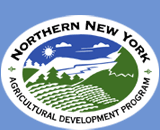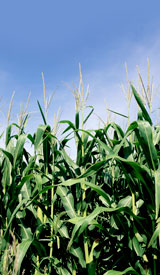

Crop Production
Projects
BMR Sorghum Sudangrass vs. Late-Planted Corn
Brown Mid-Rib Sorghum Sudangrass (BMR S/S) has been evaluated for the
areas of NNY where field, soil and climatic conditions do not allow for
a good economic return from planting corn. Past research has provided
information on fertilizing, seeding rates and cutting heights. In 2004,
researchers compared planting corn after June 1 with planting BMR S/S
to determine what date is more economically favorable to plant BMR S/S
rather than corn.
Project Contacts: Cornell Crop and Soil Science: Jerome Cherney, 607-255-0945;
Jefferson County CCE: Mike Hunter, 315-788-8450; St. Lawrence County CCE:
Peter Barney, 315-379-9192
Corn Silage and Grain Hybrid Trials
Corn silage and grain hybrid seeds were evaluated to determine their suitability
to NNY soils and climate. Results are incorporated into the silage hybrid
recommendation tables in the annual Cornell Guide for Integrated Field
Crop Management and into an annual Corn Variety Trial Report. Grain yields
have doubled since these variety trials first began.
Project Contacts: Cornell Plant Breeding: Margaret Smith, 607-255-1654; Cornell Crop and Soil Science: Bill Cox, 607-255-1758 and Jerome Cherney, 607-255-0945; Essex County CCE: Anita Deming, 518-962-4810; Jefferson County CCE: Mike Hunter, 315-788-8450; St. Lawrence County CCE: Peter Barney, 315-379-9192; Willsboro Research Farm: Mike Davis, 518-963-7492
2004 Hybrid Grain Corn Tests in
Northern New York
2004 Corn Silage Tests
2000 Hybrid Grain Corn Tests
in Northern New York
2000 New York Corn Silage
Hybrid Tests
1999 Northern New York Corn Variety Trials
Small Grain Variety Trials
Varieties of oat, spring barley, spring and winter wheat, and spring and
winter triticale were evaluated to determine their suitability to NNY
soils and climate and their potential for regional processing. Rotation
and production practices are similar to those used on Willsboro Research
Farm organic fields.
Project Contacts: Willsboro Research Farm: Michael Davis, 518-963-7492; Cornell Crop and Soil Science, Jerome Cherney, 607-255-0945; Anita Deming, CCE Essex County, 518-962-4810
2000 Small Grain Variety Trial
for Northern New York
1999 Small Grain Variety Trial for
Northern New York
1999 Small Grain-Pea Mixtures for
Forage
Forage Soybean Breeding and Variety Trials
Evaluation of forage soybeans in NNY conditions continues due to increased
interest in growing forage soybeans as a crop for Northeast dairy farms.
Nursery breeding materials are also evaluated to identify promising genetic
material.
Project Contacts: Willsboro Research Farm: Michael Davis, 518-963-7492; Cornell Crop and Soil Science: Jerome Cherney, 607-255-0945; St. Lawrence County CCE: Peter Barney, 315-379-9192
2000 Northern New York Soybean Yield
Trials
1999 Northern New York Soybean Yield Trials
Vegetable Production in NNY: New Opportunities
This project evaluates promising new vegetable crops for NNY while examining
alternative practices to enhance productivity and quality of traditional
vegetable crops. These practices include reduced pesticide application
and organic growing. Pumpkin, squash, and sweet corn are among the vegetables
tested.
Project Contacts: Cornell Horticulture: Anu Rangarajan, 607-255-1780;
Willsboro Research Farm: Michael Davis, 518-963-7492
Organic Food-Grade Soybeans Production Systems for NNY
Research evaluating an organic rotation of food-grade soybeans one year,
sweet corn one year, and alfalfa/timothy sod grown for three years includes
rotation management and weed control strategies.
Project Contacts: Willsboro Research Farm: Michael Davis, 518-963-7492; Cornell Crop and Soil Science: Jerome Cherney, 607-255-0945; Essex County CCE: Anita Deming, 518-962-4810
Press Release: October 27, 2004
Organic Soybeans: Next NNY Crop?
Soybeans
Due to increased interest in growing soybeans in 2005, the Northern New York Agricultural Development Program, with assistance from Cornell University researchers and NNY Cornell Cooperative Extension field crop educators, has developed the following fact sheets:
Growing Soybeans in NNY
Coping with Asian Soybean Rust
